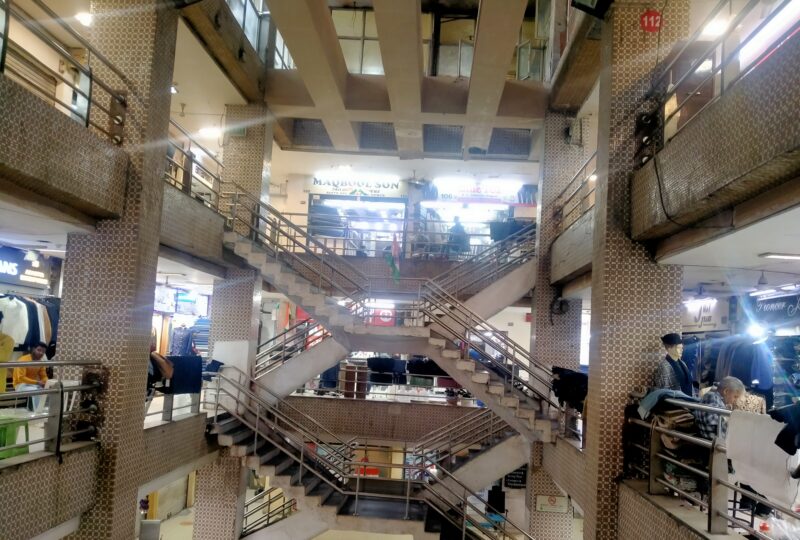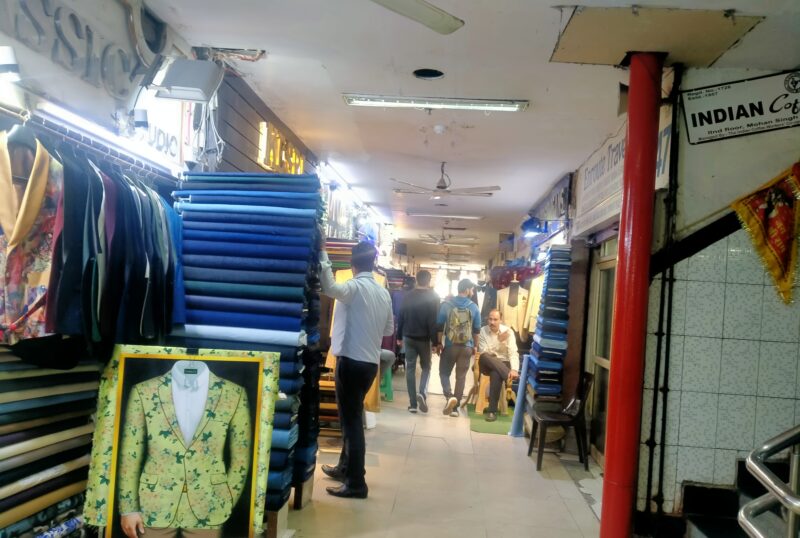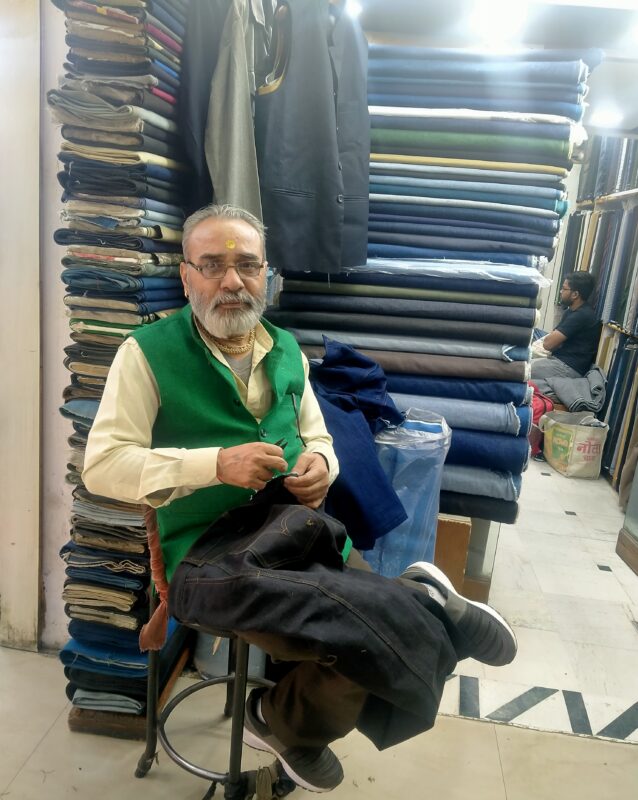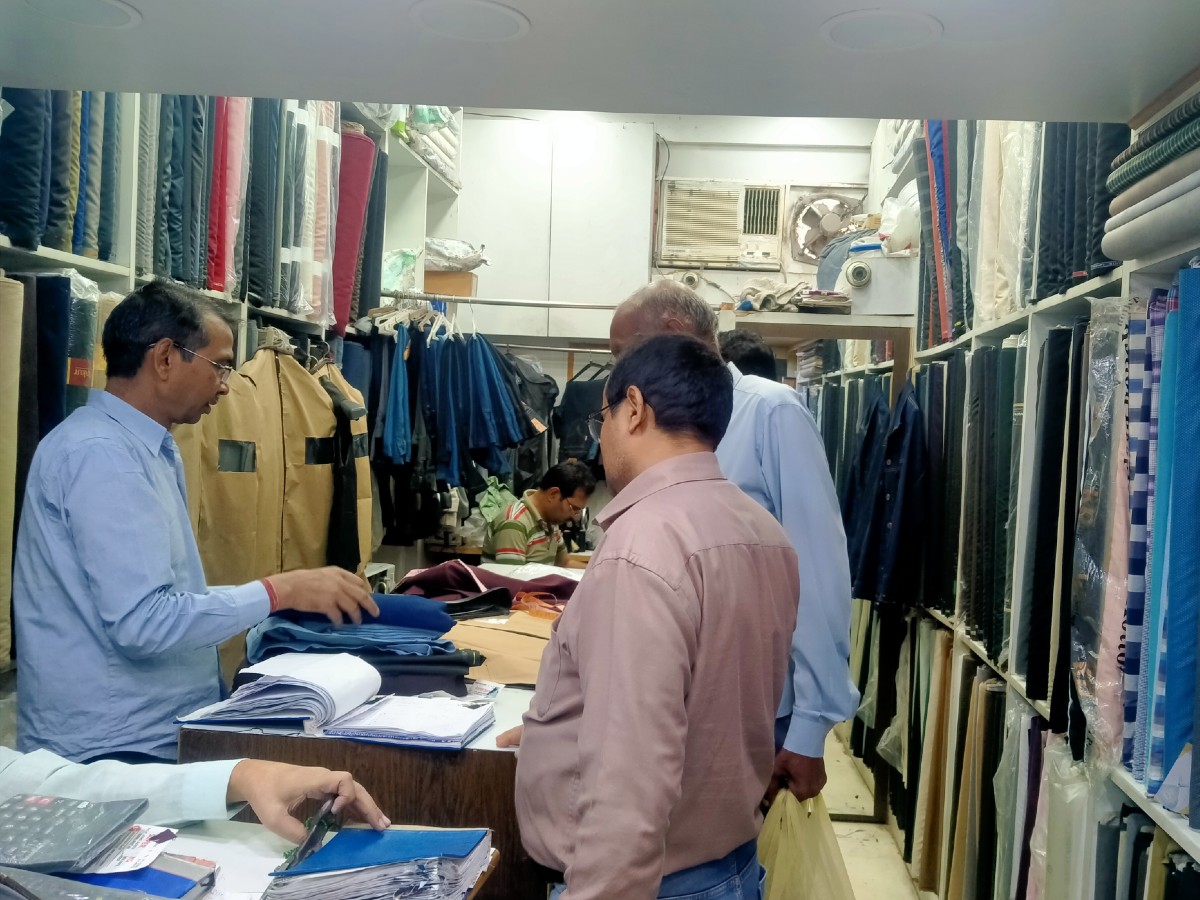Mohan Singh Place, which is literally Delhi’s first-ever mall, is struggling to stay relevant nowadays.
The market complex, sandwiched between PVR Rivoli multiplex and Hanuman Temple in Connaught Place in the heart of Delhi, comprises seven floors, and was once the go-to place for customers wanting affordable denim jeans stitched for themselves.
However, digitalisation and the influx of readymade jeans of all variety, have dealt a blow to it.
Also read – Meet the Waghris: The first authority on Delhi’s second-hand clothes
“This is a desolate mall unlike other malls that cropped up across the city in the recent past. Mohan Singh Place was the denim hub but readymade garments have almost killed our business [of denim jeans],” says SM Abdullah, the owner of Maqbool Sons Tailors and Drapers that has been in business here since 1974.
Not much activity happens, especially in the afternoon. There’s a weighing machine installed beside the iron grills at the entrance as watchmen guard the desolate building. A dog can be easily spotted on the stairs taking a nap.
Diversification into other items
To attract customers, many of the shop-owners have diversified into selling a range of other material like linen, flannel for shirts, formal trousers and even suit material. And surprisingly, sherwani as well. While they take pride in being able to stitch a pair of jeans within three hours at the most, they are also learning to keep up with evolving fashion.
Rajesh Verma, who is involved in the management of the market complex and runs the 50-year-old H.L Tailors and Drapers, says, “The young generation refrains from buying customised jeans. These days, one can get a pair of jeans in all price brackets. Just outside this building, you can see a gamut of roadside shacks that sell jeans at cheap prices. Add to this is the after-effect of pandemic. People are not willing to spend money because the priority is food. How can we expect people to shop when there’s uncertainty of food around us. So, yes the pandemic was tough on us.”
He also says that a lot of the younger generation don’t know about the building.

“While Mohan Singh Place is history, people don’t know about it. We also worked on a documentary on this place which is still available on YouTube. People passing by the building don’t know what exactly this place is offering.”
The shop-owners are also realising the importance of internet.
“We have also realised and taken note of digitalism in fashion space. These days, everyone has internet that guides them on almost everything and fashion is not an exception. So, we’ve also made our website. The young generation prefers to look at the reviews of a place before stepping in.”
Around 2/3rd of the 124 shops, on the three floors dedicated to the market, belong to tailors and drapers. These little shops were actually allotted to refugees from Pakistan. While some sold their properties and moved on, the rest remain in the building struggling with the competition from urban markets.
When Mukesh Sharma’s employer Harish, started his shop thirty years ago, there was a steady demand for denim.
“This place attracted college students the most in the past. Jeans was a rage among the youngsters. However, now everyone can buy readymade jeans from a market or a mall and therefore, we seem to be irrelevant to the new generation,” says Sharma who has been working at ‘Prince Perfect Jeans’ for over 25 years now.
Chasing the labour force
It is not just the new generation customers ignoring the complex named after Sardar Mohan Singh, one of the five Sikh building contractors of New Delhi.
The kaarigars (workers) also seem to have moved on.
There aren’t too many tailors left, because nobody wants to continue in this business full of uncertainty now.
“Kaarigars have left the city. They are either working as salesmen in some chic stores or have gone back to their native place,” complains Ramesh Pahuja, secretary of the Mohan Singh Place.

He elaborates further, “Just yesterday, I inquired from a tailor, who has been working with us for years, about his son. He said his son is doing fashion designing from a prestigious institute in Mumbai and has been working as a consultant designer for a brand. He doesn’t want to work in this shop like his father. So, you see how a change in generation and everything has affected work. Even if his son comes occasionally to the shop on weekends, he calls it a ‘time-pass work’. It’s difficult to manage [without kaarigars] but those who have given their entire life to Mohan Singh Place can’t go anywhere else.”
For many like Abdullah, it is the old, loyal customers who are keeping them afloat.
“While a lot has changed in the Mohan Singh Place, one thing that is still there is loyalty of our old customers. By the grace of Allah, I work for them. I have seen [former Prime Minister] Lal Bahadur Shastriji’s son coming to our shop and then we also had Gandhiji’s grandson, it was a beautiful time. I do have my permanent customers who are either living abroad or shifted to another corner of Delhi but they all return to me for stitching. You see this sherwani,” says Abdullah before showing a white-coloured sherwani, specifically stitched for his NRI client in United States of America.
“His father was our customer too. It is his brother’s wedding and he would be coming to pick the attire next month,” says Abdullah.
Besides loyal customers, there is hope from the revival of old fashion trends.
Majeed Khan, who manages ‘Just Jeans’ says, “We are on the revival mode as far as fashion is concerned. Ask your parents about the trends of their times and they would mention boot cuts, bell bottoms or high waist jeans. Those are coming back.”

Raj, 42, who runs the busiest shop at Mohan Singh Place, admits that the business is good “thanks to the revival of those fashion trends as well as people returning after three years to buy for the busy wedding season”.
He sells all the accessories for tailoring.
A customary glance shows that the rate of a pair of stitched jeans is between Rs 1000 to Rs 1,500. The cost varies depending on the requirement of cloth — a metre of normal denim which these tailors bring from Chandni Chowk in bulk costs around Rs 400.
Dheeraj, who has been in the business for 32 years now, fondly remembers the golden period when one could get jeans stitched for just Rs 100 or Rs 150 at the most.
“These days there are so many options available for people. Be it top-class designers or pocket-friendly patri-walas (owners of roadside shacks). Everything is easy. But above all we offer our customers best experience, one which involves them in the entire process,” he explains.
But it seems there aren’t many takers for this entire process. In a world, where customers prefer everything on their doorstep, the shop-owners at Mohan Singh Place may be fighting a lost battle.
Slowly, they are getting dismantled.
As Abdullah recalls, “In the 1970s, my shop gave the appearance of a premier showroom with mirrors and lightning. But now everything has faded.”
Follow us on:
Instagram: instagram.com/thepatriot_in/
Twitter: twitter.com/Patriot_Delhi
Facebook: facebook.com/Thepatriotnewsindia





